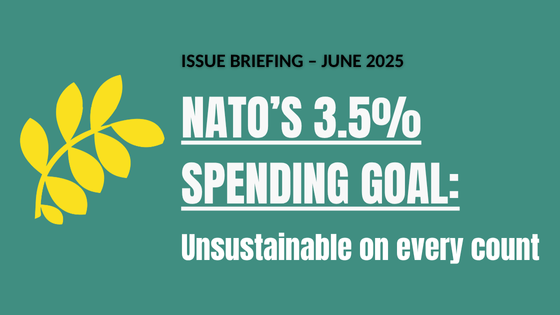Issue Briefing – June 2025
A new analysis released during the NATO summit in the Netherlands by the Transnational Institute, Tipping Point North South, and Stop Wapenhandel, reveals that NATO’s growing military build-up is severely undermining global climate goals and diverting critical resources away from climate and social investment.
Since 2021, NATO member states have increased their combined military spending by 25%, reaching US $1.5 trillion. This rise has contributed to an estimated 40% increase in the Alliance’s carbon emissions—from 196 million to 273 million metric tons of CO2 equivalent. In 2024 alone, European NATO members and Canada recorded their steepest annual spending increase in decades at 17.9%.
At the 2025 summit, NATO leaders are debating a proposed new target of 3.5% of GDP for military spending. If adopted, this would raise NATO’s total military expenditure to US $13.4 trillion by 2030—an increase of US $2.6 trillion over current levels. This sum could alternatively fund nearly three years of climate finance commitments to developing countries or fully upgrade the global electricity grid to meet Net Zero standards.
The environmental implications are equally stark. Cumulative military emissions under the 3.5% target are projected to reach 2,330 million metric tons of CO2 equivalent by 2030—roughly equal to the combined annual emissions of Brazil and Japan. This would effectively cancel out the European Union’s 2030 emissions reduction targets. Moreover, Europe’s main climate funding mechanism—the Recovery and Resilience Facility—is due to end in 2026, leaving a €180 billion funding gap through 2030.
NATO countries already spend 52 times more on military budgets than on climate finance. Between 2023 and 2024, military spending increased by 14.8%, while aid budgets declined by 7.3%. If the 3.5% benchmark spreads to other nations, it could trigger a global arms race, further increasing emissions and diverting resources from essential development and climate programs.
The briefing warns that deepening militarization risks locking the world into a cycle in which security is pursued at the expense of climate stability, global resilience, and social equity. As NATO leaders meet in The Hague this week, the choice is clear: continue down the path of unsustainable militarism or invest in a more secure and sustainable future.
Deborah Burton, co-founder of Tipping Point North South said:
“NATO is driving a rearmament agenda that does one thing only: increases global insecurity on every level at this critical moment in human history. It will further accelerate the arms race, further increase greenhouse gas emissions and shamefully, add trillions to the war machine whilst those same rich NATO member countries rob the global south of reparatory climate finance. We urgently need to de-escalate tensions and find peaceful solutions to conflicts if we are to defend our planet.”
Nick Buxton, climate security researcher at Transnational Institute , said:
“NATO calls itself a security alliance, but it is fueling rather than preventing the climate crisis, which is the biggest security threat faced by humanity. Rather than announcing unnecessary military spending increases that only reward arms companies, they should be investing in ending poverty, rebuilding welfare systems, creating green jobs, and supporting those most impacted by climate change.”
Notes:
- Media Contacts available for media interviews/requests
- Nick Buxton (California, Pacific timezone), nick@tni.org; +1-530-902-3772; Josephine Valeske (Amsterdam, CEST) j.valekse@tni.org
- Deborah Burton (CEST, in Bonn at UNFCCC SB62 until 20 June), +44 7779 203455
- Mark Akkerman (CEST, Netherlands) +31 610328106, m.akkerman@stopwapendel.org
- The full briefing, NATO 3.5% spending goal: Unsustainable on every count, will be published at 00:01 CEST on 19 June 2025 at http://www.tni.org/natoclimate2025. An advanced copy is available by emailing nick@tni.org
- The briefing is an update of figures based on a longer report that examined NATO’s contribution to climate change that was published in 2023 at https://www.tni.org/en/publication/climate-crossfire. You can also find further TNI research on climate and militarism at https://www.tni.org/en/topic/climate-security
This publication was produced in partnership with the Transnational Institute, International Peace Bureau, International Physicians for the Prevention of Nuclear War, Stop Wapenhandel, and other organizations committed to peace and climate justice.
Read the full briefing in English:

